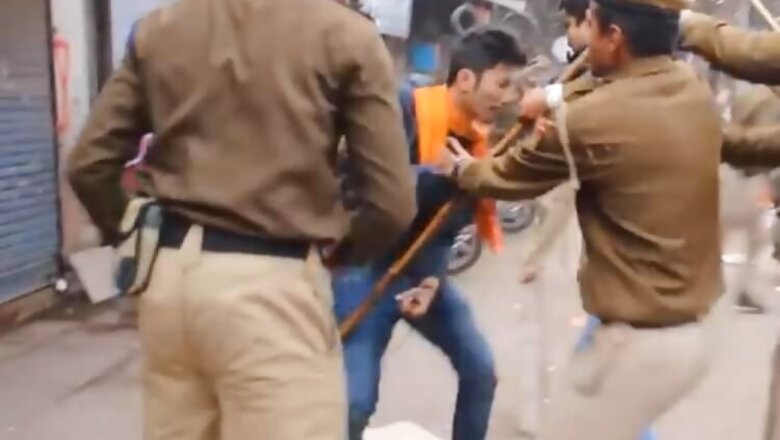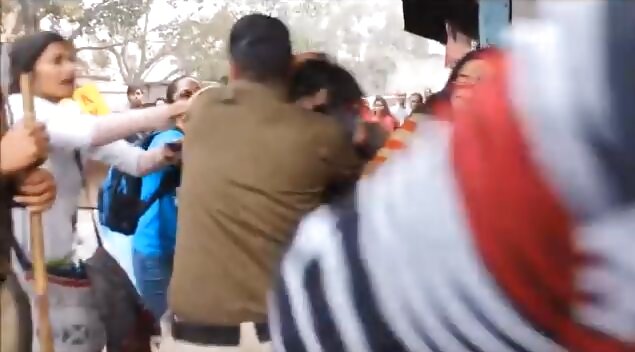
views
In a chilling video of Delhi Police thrashing the JNU students protesting in front of RSS office in Delhi on January 30, 2016, a constable is seen punching a full blow on the face of a girl and pulling her by hair to the ground. Another girl accompanying the victim is screaming and trying to save her friend. She is also not spared and appear to have been hit.
This is besides the footages of police lathi charge in which few civilians are also seen beating up the students. As an JNU alumnus, this author empathies and stands by these students who think it to be their inalienable democratic right to protest. Unfortunately, they were up against a dispensation that does not think so and rather would like to stifle all voices of dissent.
The media was also not spared. ‘Catch News’ journalist Vikas Kumar was assaulted and had his camera allegedly snatched by Delhi Police. It is not clear as to who ordered the lathi charge and beating of girls by the male police. Delhi Police is in denial mode and has just ordered a routine exercise of seeking a report of the incident from the concerned Joint Commissioner of Police.
The video of this incident went viral on social media triggering sharp reactions from the civil society members and opposition parties alike. Delhi Chief Minister Arvind Kejriwal alleged that the police force was being used as RSS and BJP's "private army" under a political dispensation that is at "war" with students across the country.
This is a case of pure brutality by Delhi Police in collusion with the party in power. Delhi Police has countless such instances in past to shame itself. On January 25, 2014, a video was viral on Facebook in which three Delhi policemen were beating a man with sticks and taking his money. The clip was filmed near Red Fort in Delhi and the poor victim can be seen pleading with those brutal policemen and wincing in pain as they forced him to grip railings while they thrash him with canes.
As per the Section- 4 of Delhi Police Act, 1978, the superintendence of the Delhi police throughout Delhi shall vest in, and be exercisable by the Administrator and any control, direction or supervision, exercisable by any officer over any member of the police force shall be exercisable subject to such superintendence.
Section 2(a) of the above Act says that unless the context otherwise requires “Administrator” means the Administrator of Delhi appointed under Article 239 of the Constitution. The Administrator in this context is the Lt. Governor of Delhi. Now it is to be seen as to what action the Lt. Governor, who calls himself ‘Government’ also, takes against the delinquent Delhi Police officials.
The unfortunate aspect of the maintenance of law and order of Delhi is that the police is not under the elected Government and by implication not accountable to people of Delhi.
Police brutality is a civil rights violation that occurs when a police officer acts with excessive force by using an amount of force with regards to a civilian that is more than necessary. Excessive force by a law enforcement officer is a violation of a person's rights. Excessive force is not subject to a precise definition, but it is generally held to be beyond the force a reasonable and prudent law enforcement officer would use under the circumstances.
The police system in India is set up under the provisions of the Police Act of 1861. This legislation was enacted in the wake of the 1857 revolt. This revolt had led the British to take some serious measures for strengthening their rule in India. The establishment of an authoritarian police force was one of them. As per the 1861 Act, the police forces in India were unaccountable to anyone except to their own hierarchy and the colonial masters. Making the police accountable to the community or other democratic or local indigenous institutions did not fit into the British colonial interest.
The advent of independence changed the political system but the police system more or less remained unaltered. In 1996, Prakash Singh, a retired police officer petitioned the supreme court under Article 321 of the Constitution against the abuse of power and inefficient working of police. The Supreme Court in its judgment in this (Prakash Singh vs. Union of India, 2006), inter alia, instructed the Government to set up Independent Police Complaints Authority at state and district level to look into the complaints against police officers.
But hardly any State has complied with it. The lack of improvement in the policing in India also stems from the disinterest of successive Governments to implement any suggestion or recommendation either by the Court or by any Expert Committee.

The brutality of police is unacceptable and has to addressed as a blot on free democratic society. The impunity available under law to the erring police officials calls for a review. There is a need to amend Section 197 of Criminal Procedure Code which provides impunity from prosecution to abusive police officials against any act done during discharge of duty.
The state governments must now set up Police Complaints Authorities to inquire into the complaints of police brutalities. This authority should be independent of the political influence and should be vested with such legal powers and resources as are necessary to function. Only a mechanism of an external accountability like this can serve as a deterrent to the errant police officials.
India is a signatory to the Universal Declaration of Human Rights adopted on January 10, 1948 by UN General Assembly and also to the Code of Conduct for the Law Enforcement Officials adopted on 17th December 1979. On the similar lines, Government of India too, on 4th July 1985, had issued a Model Code of Conduct for the police. The Section 4 of this code says: “In securing the observance of law or in maintaining order, the police should as far as practicable, use the methods of persuasion, advice and warning. When the application of force becomes inevitable, only the irreducible minimum of force required in the circumstances should be used.”
But India is one of the worst countries as far as its report card with respect to adherence of the above is concerned. ‘Human Rights Watch’ in a report released in 2009 said that successive Governments have failed to deliver on promises to hold the police accountable for abuses and to build professional, rights-respecting police forces.
Its 118-page report, "Broken System: Dysfunction, Abuse and Impunity in the Indian Police’, documents a range of human rights violations committed by police, including arbitrary arrest and detention, torture and extrajudicial killings. The report is based on interviews with more than 80 police officers of varying ranks, 60 victims of police abuses, and numerous discussions with experts and civil society activists. It documents the failings of state police forces that operate outside the law, lack sufficient ethical and professional standards, are overstretched and outmatched by criminal elements, and unable to cope with increasing demands and public expectations. Field research was conducted in 19 police stations in Uttar Pradesh, Karnataka, Himachal Pradesh, and the capital, Delhi.
A series of Supreme Court judgments have laid down the ratio of holding the state liable for police misconduct, abuse of power and, making pecuniary compensation a significant remedy for such violation of fundamental rights. The legal position as it stands now is clear that a violation of fundamental rights due to police misconduct, can give rise to a liability under public law, apart from criminal and law of torts. The Supreme Court has also held that the doctrine of sovereign immunity does not apply to cases of fundamental rights violation and hence cannot be set up as defence in public law.
The courts need to have little more of the judicial vigilance and pursue every complaints filed against police brutality and bring the offenders to justice. It must be made abundantly clear to police that if they resort to unnecessary and excessive use of force, they will have to face consequences. This is the minimum requirement of a civilized society which claims to be the biggest democracy.




















Comments
0 comment